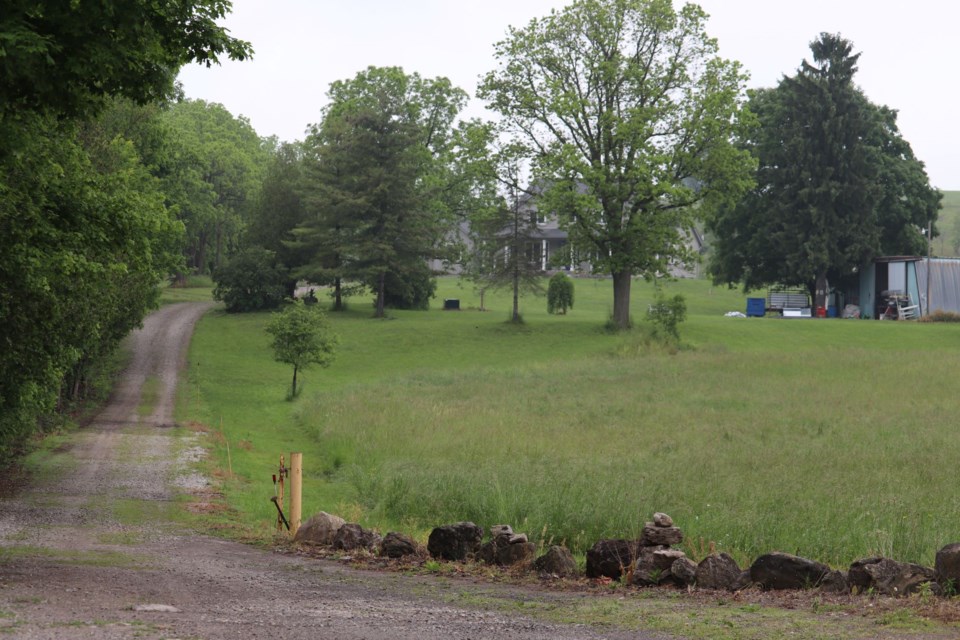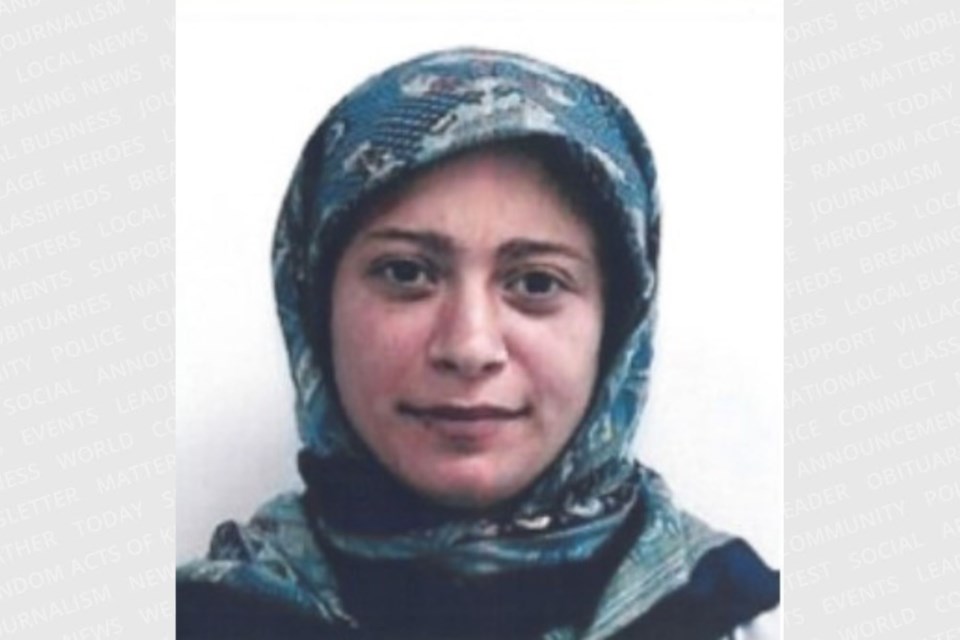EDITOR’S NOTE: This is Part One in a series about the disappearance of Nuseiba Hasan, led by Oakville News' sister site Flamborough Today.
Late in the fall of 2006, Nuseiba Hasan disappeared. She left the apartment she shared with her boyfriend in downtown Hamilton around the end of November. The trees would have been mostly bare, and the night would have come on quickly.
No one knows for sure what day it was, but all traces of her existence — bank transactions, medical records, social media posts — came to an abrupt halt on Nov. 26, 2006, exactly 18 years ago today.
Nuseiba had all her personal belongings with her the day she vanished. Outside the apartment, a family member was waiting to pick her up. She got into their vehicle, and they drove out of the city to their family farm on 8th Concession W., in the peaceful heart of Flamborough.

That was the last time she was reported being seen or heard by anyone, almost two decades ago. Nuseiba Hasan was 26 years old.
For a long time, nobody knew the young woman was even missing. It wasn’t until nine years later, in 2015, that a family member slipped up and told police they believed Nuseiba was murdered by a relative.
Within a month of that revelation, the Hamilton Police Service launched a homicide investigation that remains open and active all these years later. Police say they have a good idea what happened to Nuseiba, but they need certain people to come forward and finally tell the truth.
Who was Nuseiba Hasan? Was she murdered? Was she the victim of an honour killing, targeted by relatives because she somehow shamed her Muslim family? On the anniversary of her disappearance — and on the heels of a recent court ruling that declared the missing woman officially dead — FlamboroughToday takes a deeper look at a local unsolved mystery.
Detective Daryl Reid worked the case when it first opened, and nine years later he is the primary investigator. Although Nuseiba’s remains have never been discovered, he has no doubt she was murdered.
“We do believe family members got her to the family farm where her untimely demise took place,” Reid tells FlamboroughToday. “But we won't identify who in that investigation is the actual suspect.”
Who was Nuseiba Hasan?
The years moved on since Nuseiba's disappearance, but court documents from when she was declared legally dead in 2022 paint a picture of a young woman in a tough position.
Born in Jordan, Nuseiba was short and slender with dark hair. Her friends described her as beautiful and bright. At the time of her disappearance, she was a student at Fanshawe College, working on a travel and tourism diploma.
Friends said she had a beautiful singing voice. She loved Lauryn Hill and The Fugees. She liked to read in the park, picnic and rollerblade. Her friends said she was always someone who would do anything for you, who would always bring a gift to a visit. They said she was generous and thoughtful.
But she struggled as well.
She lived in a shelter at 16. A friend of Nuseiba’s later told the Children’s Aid Society (CAS) she entered the shelter because she was facing physical abuse at home. According to the documents from CAS, Nuseiba’s parents forced her to return to Jordan after a few months in the shelter system.
As a teen, Nuseiba "was felt to have rebelled,” the records read.
She lived in Jordan for two years until she turned 18, then returned to Canada with the help of the Canadian government.
In 1999, when she was 19 years old, Nuseiba gave birth to a daughter. She raised the child for two years before relinquishing her to CAS.
According to CAS records filed in court, she did her best to take care of her daughter. But her relationship with the biological father was abusive. In December 2001, Nuseiba pressed charges against her child’s father, but didn’t show up to court because she was afraid of him retaliating.
He retaliated anyway, the records show. She was assaulted once by him, and then again by one of his friends while he was incarcerated.
The injuries from the assault forced her to drop out of her college program.
Nuseiba surrendered her daughter on March 1, 2001 and did not attempt to keep in contact with her.
Her final meeting with CAS was in April 2001, where the report says Nuseiba “felt there was a possibility that she could re-unite with her family if she were no longer a single parent.”
Nuseiba’s child was in a six-month Society Wardship, which meant CAS was interested in reuniting Nuseiba with her daughter. After April 2001, Nuseiba did not continue contact with the CAS.
Eventually, CAS put an ad in The Hamilton Spectator, trying to find and contact Nuseiba. She did not respond to the ad, but a friend did. That friend provided information that suggested Nuseiba may have returned to Jordan for a period after her daughter was surrendered to CAS.
In the file, a CAS worker wrote that Nuseiba was estranged from her family because her behaviour clashed with their strict Muslim principles.
“It was hard for your birth mother because of the cultural differences she experienced,” the report reads. “She understood that in the event of a marital separation in Jordan, the birth father would assume care of the children. This was because a single mother could not remarry if she had children from a previous union.”
The report described Nuseiba as being guarded “to the point of it being a bit odd,” and said she was “God-fearing.”
Nuseiba’s family never reported her missing to Hamilton police.

A long-awaited tip
She ran away, they assumed. Nuseiba was a first-generation Canadian with a Jordanian passport. That’s probably where she was, the family maintained. Not that anyone seemed to ask.
Until a cold day in February, nine years later, when someone in the family finally let something slip to a friend. That friend was Const. Rick Buys, an officer with Halton Regional Police.
That same day, Const. Buys filed a missing persons report with Hamilton police.
The family member who spoke to Buys, who remains anonymous in all documentation about Nuseiba’s case, told him Nuseiba hadn’t been seen or heard from since that fall day in 2006 — and that another family member had killed her.
Reid, the lead investigator in Nuseiba’s case, was limited in what he could tell FlamboroughToday because the investigation is ongoing. But he is certain that Nuseiba did not leave the farm alive. Her case was reclassified as a homicide a few weeks after she was declared missing.
"It is our theory that while she was at the family farm in Flamborough, she was a victim of foul play and that ultimately her remains were disposed of," he said.
The footprint ends
The Hasan family no longer lives at the secluded farmhouse on Concession 8. It is difficult to sit at the end of the driveway and not imagine Nuseiba on her last car ride toward the house.
In a sworn affidavit filed as part of the death certificate proceeding, Reid wrote: “We interviewed numerous members of Nuseiba's family, including the family member who allegedly made a comment about killing Nuseiba.”
Was it one of her seven siblings? A parent? Reid is unable to say. But police were able to search through Nuseiba's personal records, both paper and digital.
Everything went quiet in late 2006.
The last recorded contact Nuseiba had with anyone was with Social Services on Nov. 26, 2006 — 18 years ago today. That is when her medical records and bank transactions also end. Her driver’s licence expired in 2007 and has never been renewed. The last post she ever made on social media was in November 2006.
Did she flee the country? The Canada Border Services Agency only records when Canadians return to the country with their passports, not when they leave. The last recorded time Nuseiba used her passport was in August 2005, more than a year before she vanished. Her passport expired in 2011 and was never renewed.
The Royal Canadian Mounted Police later joined the investigation, looking into claims Nuseiba was living in Jordan. The RCMP did not find any evidence she was living there.
She had been taking classes with Fanshawe College and didn’t complete her course.
In his affidavit, Reid wrote: “Nuseiba had no other support network or other financial means that would allow her to disappear on her own and remain hidden for the last 15 years.”
Reid wrote that all interview statements taken in 2015 suggested the last time Nuseiba was heard from was that day in the fall, when a family member brought her out to the farm, “after which no one reported hearing from Nuseiba.”
According to publicly available property records retrieved by FlamboroughToday, the family farm on Concession 8 West was purchased in September 2006 — just two months before Nuseiba vanished.
When Musa Hasan, Nuseiba’s father, died in 2012, his wife Yamenah — Nuseiba’s mother — became the sole owner. She then sold the property in a transaction that closed on Oct. 14, 2016, records show.
Less than three weeks later — on Halloween Day, 2016 — police arrived at the address to execute a search warrant. Officers from three other forces (Halton, Guelph and the Ontario Provincial Police) worked alongside Hamilton Police to search the home, with the consent of the new owners.
The search turned up no trace of Nuseiba or any of her belongings.
After almost 10 years, the investigation is still active
There is a nine-year gap between Nuseiba’s disappearance and the start of the investigation. In those nine years, Reid said “people's memories fade, people's interest in cooperating might fade.”
“The first few days or first few weeks of an investigation are the most fruitful,” he told FlamboroughToday.
Reid said this particular search is likely the most time- and resource-consuming investigation he has worked on in his career.
“It's the longest delay that I've had in one of my investigations between when things occurred and the reporting to the police,” he said.
But time also has some benefits, he said. Police were able to begin a homicide investigation very soon after the initial missing persons report came in.
Since the file was opened on Feb. 11, 2015, another nine years has passed. But Reid said the case is still “open and active.”
“There are still actions that need to be taken,” he said. “There are people that we are hoping will still come forward and speak to us. Until all of those are exhausted, we would not call it a cold case.”
And time, he said, can sometimes make people more co-operative.
While Reid is limited in what he can say, he was clear when he spoke to FlamboroughToday about who needs to come forward.
“We know that there are members of this family that have more information for us and we hope that one day they find the courage to come forward and speak to us,” Reid said.
When asked if Hamilton Police consider Nuseiba’s homicide to be an “honour killing” — in which a woman is murdered for failing to uphold traditional cultural values, such as chastity — Reid said the investigation has looked at several scenarios.
“You can't get tunnel vision and you can't look at just one avenue,” he said. “You have to cover off everything.”
Although none of her immediate family members have come forward to help police, one person has taken up a call for justice in Nuseiba's case: the daughter she put up for adoption all those years ago.
More to come
This article is Part One in a two-part series on the disappearance of Nuseiba Hasan. This article covers the facts of the case as presented by Hamilton Police.
But to understand what led to Nuseiba’s disappearance, it is crucial to understand the years leading up to her disappearance — and to hear from the daughter Nuseiba put up for adoption, who continues to fight for justice.
